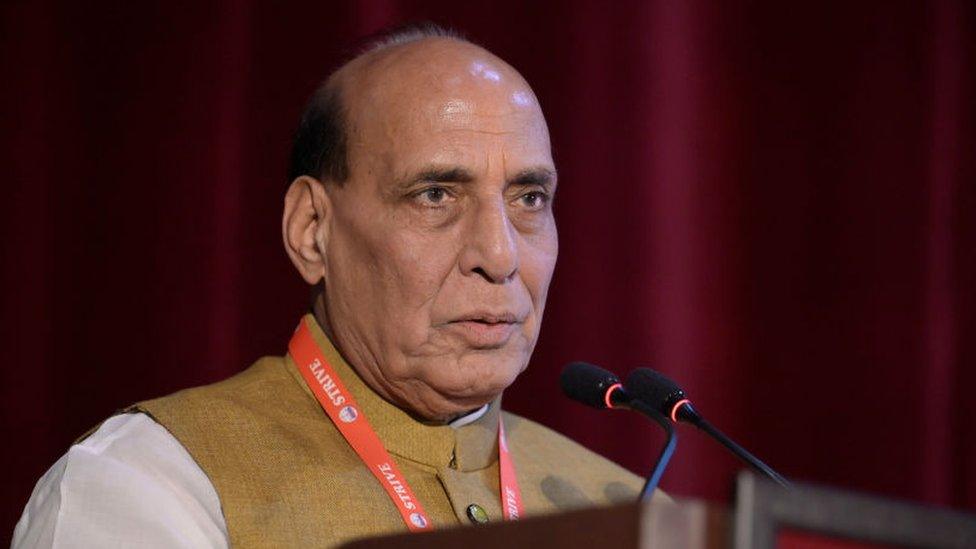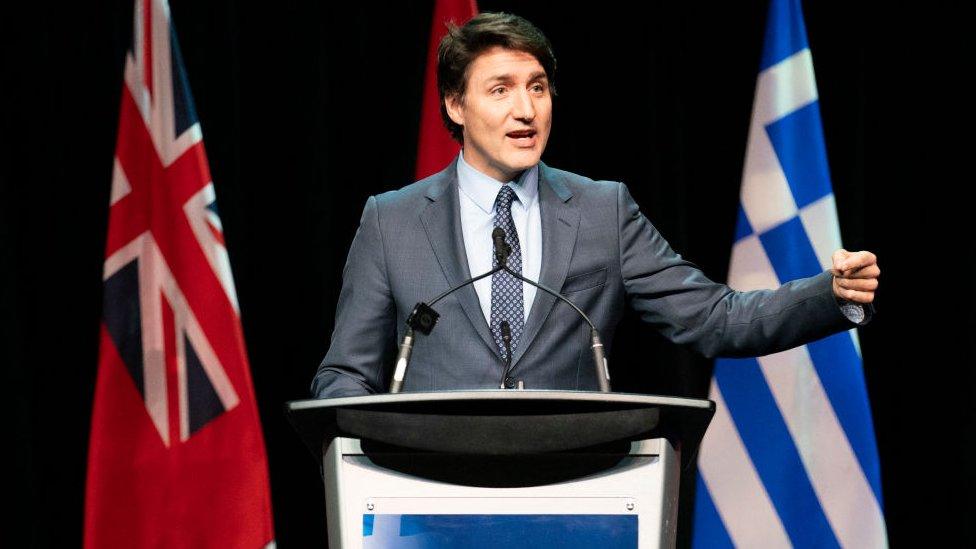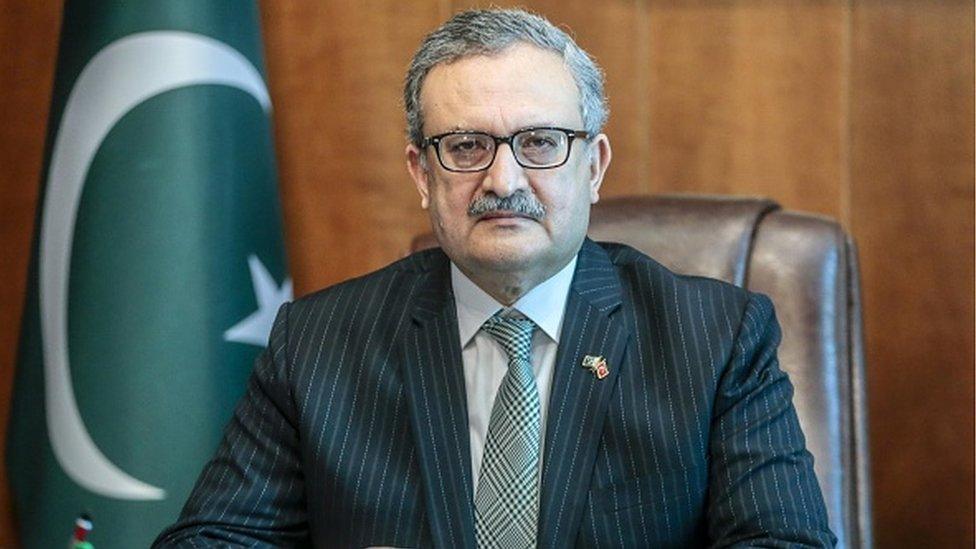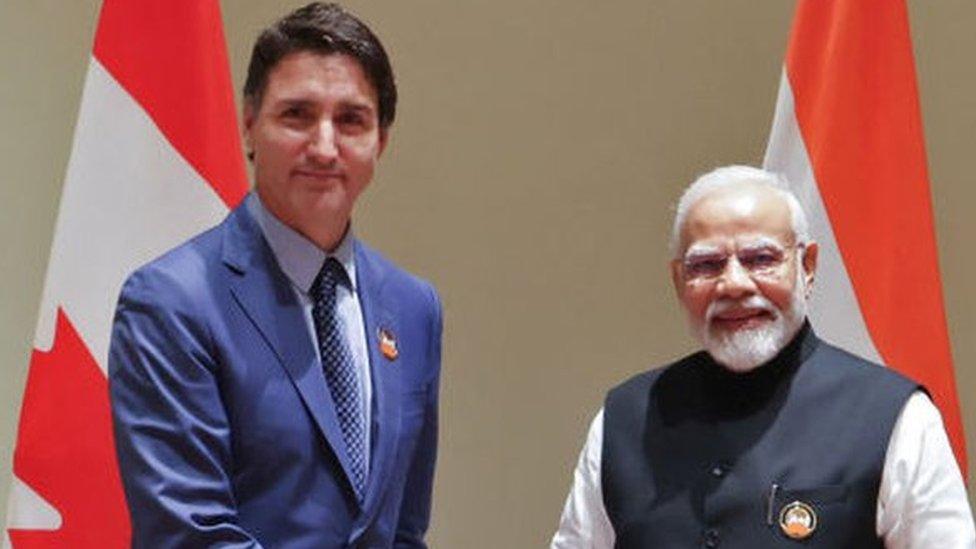India and Pakistan trade barbs over targeted killings
- Published

India's Defence Minister Rajnath Singh's remarks have been criticised by Pakistan
India and Pakistan are trading barbs after a news report said that Delhi had carried out at least 20 extrajudicial killings in the neighbouring country.
India has not officially reacted to the allegations, which were made in The Guardian newspaper, external last week.
But on Friday, its defence minister said that India would kill anyone who escaped to Pakistan after disturbing peace in the country.
Pakistan has reacted sharply, calling the remarks provocative.
The two countries share a tense relationship and have fought three wars since they became independent nations in 1947.
Relations reached an all-time low in 2019, when India carried out airstrikes on militant camps in Pakistan's Balakot region as retaliation for a suicide attack that had killed 40 troops in Indian-administered Kashmir.
Pakistan-based terror group Jaish-e-Mohammad had claimed responsibility for the attack, which took place in Pulwama district.
Since then, an uneasy lull has prevailed over the countries' ties.
The latest flare-up of tensions began on Thursday after The Guardian in a report claimed that India had been involved in killing at least 20 people in Pakistan since 2020 as part of a broader policy to "target terrorists living on foreign soil".
The allegation comes months after Canada also accused India of carrying out extrajudicial killings in the country - a charge Delhi denies.
It also comes at a time when India is weeks away from general elections, which are set to be held from 19 April. Pakistan is an emotive issue in India and analysts say that politicians, especially from the governing Bharatiya Janata Party (BJP), often use it as a nationalistic poll plank to curry favour with voters.
In the report, the newspaper quoted "senior officials from two separate Pakistani intelligence agencies" who claimed that India's spy agency - the Research & Analysis Wing (RAW) - was directly involved in the assassinations.
The unnamed officials claimed that India's targeted assassinations in Pakistan and the West had "increased significantly" since 2023 and that Delhi had drawn inspiration from other foreign spy agencies, which have been linked to extrajudicial killings on foreign soil.

Prime Minister Justin Trudeau has accused India of carrying out extrajudicial killings in Canada
The report goes on to cite two unnamed Indian officials as saying that India decided to target dissidents abroad after the Pulwama attack in 2019.
"After Pulwama, the approach changed to target the elements outside the country before they are able to launch an attack or create any disturbance," an unnamed Indian intelligence operative is quoted as saying.
"We could not stop the attacks because ultimately their safe havens were in Pakistan, so we had to get to the source," he said, adding that such operations "needed approval from the highest level of government".
India did not immediately respond to the newspaper's allegations, although the report quotes the foreign ministry citing a previous denial made by Foreign Minister S Jaishankar that targeted killings in other countries were "not the government of India's policy".
But on Friday, India's Defence Minister Rajnath Singh said that "any terrorist trying to create turmoil in India won't be spared".
"If they run away to Pakistan, we will enter Pakistan to kill them," Mr Singh told CNN-News18 TV channel, external in response to a question about the Guardian report.
Hours later, Pakistan's foreign office put out a statement, external calling Mr Singh's remarks provocative. "Such myopic and irresponsible behaviour not only undermines regional peace but also impedes the prospects of constructive engagement in the long term," it said.
Islamabad claimed it had provided "irrefutable evidence" linking India to extrajudicial killings in its country and called on the international community to "hold India accountable for its illegal actions".
It also added that "India's assertion of its preparedness to extra judicially execute more civilians, arbitrarily pronounced as 'terrorists', inside Pakistan constitutes a clear admission of culpability".
India has not yet responded to the latest allegations by Pakistan.
In September, Canadian Prime Minister Justin Trudeau had claimed that there were "credible allegations potentially linking" the Indian state to the murder of Sikh separatist Hardeep Singh Nijjar.
India has denied the allegations and has said that Canada has not shared "concrete evidence" to back the claim.
In November, the US too had said that it had foiled an alleged plot by an Indian national, Nikhil Gupta, to assassinate Sikh separatist leader Gurpatwant Singh Pannun.
India denied any involvement but said it was "co-operating" with US authorities on the issue.

Read more India stories from the BBC:

- Published26 January 2024

- Published19 September 2023
